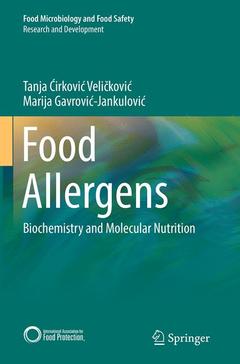Food Allergens, Softcover reprint of the original 1st ed. 2014 Biochemistry and Molecular Nutrition Research and Development Series
Auteurs : Ćirković Veličković Tanja, Gavrović-Jankulović Marija

A food allergen has the ability to first elicit an IgE response, and then, on subsequent exposures, a clinical response to the same or similar protein. How harmless food protein becomes recognized by the mucosal immune system as an allergen remains an open question and more data are needed to explain how regulatory mechanisms of the mucosal immune system fail and result in allergic sensitization to dietary antigens.
Some biochemical characteristics associated with food allergens, such as the presence of multiple, linear IgE-binding epitopes and the resistance of the protein to digestion and processing, seem to predominate among food allergens. Digestion susceptibility of food allergens that sensitize via the gastrointestinal tract and stability to food processing conditions are inherently related to protein structural features. Thereby, physiological changes in the digestion process, pathological conditions affecting digestion, as well as procedures and food processing conditions that affect protein structure may all have a profound effect on the sensitizing potential and allergenicity of food proteins. In addition, signals coming from the diet and micro biome can modulate regulatory mechanisms of the mucosal immune system and influence mucosal immunity and intestinal barrier function.
The detection of allergenic ingredients in food products has received increased attention from the food industry and legislative and regulatory agencies over recent years. This has resulted in the improvement of applied safety measures that provide protection for food-allergic consumers and development of sensitive and highly specific analytical methods of food allergens detection. Food allergy is an important and common health issue and therefore there is a need to characterize the sensitizing potential of newly introduced proteins in genetically engineered foods. A combination of in vitro and in silico methods provide information thatcontributes to safety assessment. Suitable in vivo models may provide a more holistic assessment of allergenic potential of novel food proteins.
Date de parution : 09-2016
Ouvrage de 208 p.
15.5x23.5 cm
Date de parution : 06-2014
Ouvrage de 208 p.
15.5x23.5 cm
Disponible chez l'éditeur (délai d'approvisionnement : 15 jours).
Prix indicatif 105,49 €
Ajouter au panier

